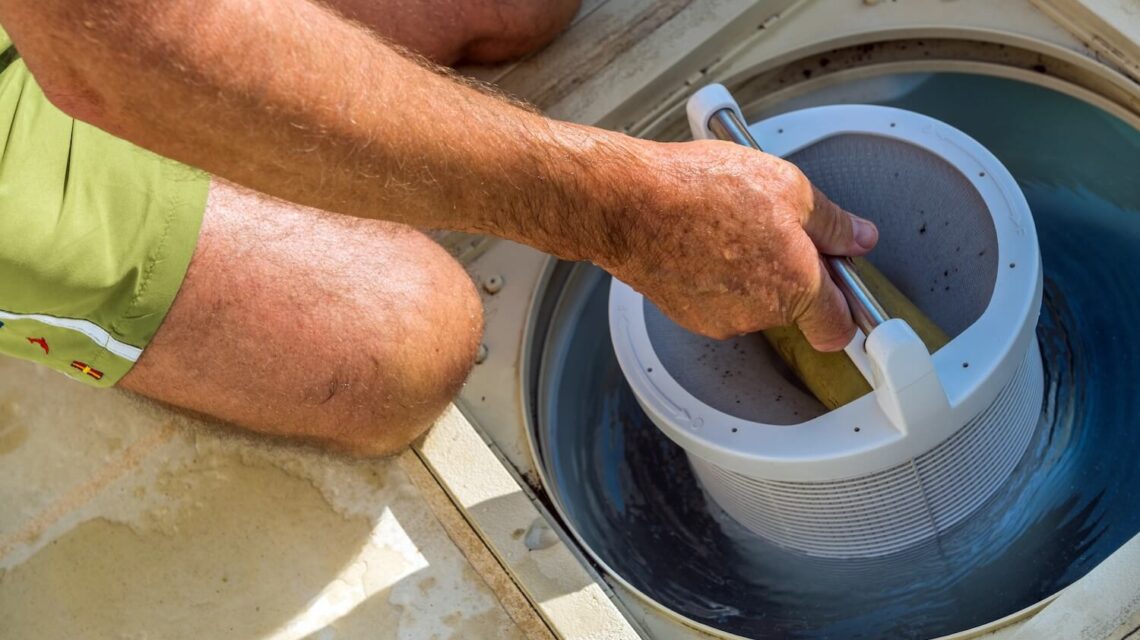Owning a pool is an investment that provides both relaxation and recreation. Whether it’s a backyard oasis or a community pool, keeping it clean and well-maintained is key to enjoying your pool to the fullest. One of the most essential components in maintaining pool water quality is the pool filter. Regular filter maintenance ensures that your pool water stays clear, healthy, and inviting for swimmers. A poorly maintained filter can lead to murky, unhealthy water and higher maintenance costs.
This comprehensive guide will explore how regular filter maintenance keeps your pool sparkling and why it’s essential for pool longevity.
We will examine how pool filters work, different types of filters, the importance of regular maintenance, and step-by-step instructions on how to keep your filter in peak condition.
The Importance of a Pool Filter: The Heart of Pool Cleanliness
A pool filter is like the heart of your pool’s filtration system. It works tirelessly to remove dirt, debris, algae, and other contaminants, keeping your water crystal clear. Every time your pool’s water circulates, it passes through the filter, which traps harmful particles. A clean, well-maintained filter ensures that the water remains clean and the pool remains safe for swimming.
Not only does a filter improve the visual quality of the pool water, but it also contributes to the pool’s chemical balance, ensuring the water remains at the proper pH, calcium hardness, and chlorine levels. Without the filter, your pool would quickly become a breeding ground for algae and bacteria, making it unsafe and unpleasant for swimming.
Types of Pool Water Filters
Understanding the different types of pool filters is important because maintenance can vary depending on the filter type. There are three main types of pool filters: sand, cartridge, and Diatomaceous Earth (DE) filters. Each one operates differently, and the maintenance required for each type differs slightly.
1. Sand Filters
Sand filters are the most commonly used pool filters. They use a bed of sand to trap dirt and debris. As water flows through the sand, particles become trapped in the sand grains. This process keeps the water clean and prevents debris from circulating back into the pool. Sand filters are easy to operate and require regular backwashing.
Maintenance Requirements for Sand Filters:
- Backwash the filter every 2-4 weeks or when the pressure gauge indicates an increase of 8-10 PSI.
- Replace the sand every 3-5 years, depending on the filter’s usage and the quality of the sand.
2. Cartridge Filters
Cartridge filters use a set of replaceable cartridges to filter water. These filters are more efficient than sand filters because they can trap smaller particles. Cartridge filters are typically easier to maintain and have lower energy costs compared to sand filters.
Maintenance Requirements for Cartridge Filters:
- Clean the cartridges every 3-6 months.
- Replace the cartridges every 1-3 years.
- To clean the cartridges, remove them from the filter housing and rinse them with a hose. For deeper cleaning, soak the cartridges in a special filter-cleaning solution.
3. Diatomaceous Earth (DE) Filters
DE filters provide the finest filtration and are capable of trapping very fine particles. These filters use diatomaceous earth powder, a fine white powder made from fossilized remains of aquatic organisms. The powder is spread over a filter grid, which traps contaminants as water passes through.
Maintenance Requirements for DE Filters:
- Backwash the filter every 2-4 weeks.
- Replace the DE powder after each backwashing.
- Clean the grids every 6 months or as needed.
Each of these filters requires specific attention to ensure they continue to work effectively. By maintaining your pool filter regularly, you can keep your pool’s water sparkling and safe.
How Pool Filters Keep Your Pool Clean
A pool filter is designed to trap contaminants, keeping the water clear and preventing debris from settling in the pool. Filters work continuously to maintain the water quality by removing particles, bacteria, and algae. Let’s break down the key functions of a pool filter.
1. Trapping Debris
As debris such as leaves, dirt, and twigs fall into your pool, your filter captures them before they have a chance to sink and contaminate the water. Regular filter maintenance ensures that the filter can capture all debris effectively, preventing the need for frequent manual cleaning.
2. Removing Micro-Contaminants
Filters don’t just remove large particles—they can also trap smaller contaminants, including dust, pollen, and bacteria. This is particularly important for swimmers’ health, as it helps to prevent the spread of bacteria that can cause illnesses like skin infections or stomach upset.
3. Preventing Algae Blooms
Algae can grow rapidly in a pool, especially when water becomes stagnant and warm. A clean filter helps prevent algae by removing spores from the water before they can multiply. In addition, a properly functioning filter keeps the water circulating, which discourages algae from settling.
4. Reducing Pool Chemical Usage
When the filter does its job efficiently, your pool’s chemicals can maintain their balance longer. A clean filter helps stabilize the pool’s pH, alkalinity, and chlorine levels, reducing the need for constant adjustments. This translates to fewer chemicals and lower costs for pool maintenance.
The Risks of Not Maintaining Your Pool Filter
Neglecting your pool filter can lead to several issues that affect water quality, pool system efficiency, and even your wallet. Below are the consequences of poor filter maintenance:
1. Murky Water
One of the most immediate signs of a dirty or clogged filter is murky water. If the filter cannot effectively trap dirt and debris, the water will quickly become cloudy and unappealing. It becomes harder for chemicals to maintain balance, and you may need to add more chlorine, which can be costly.
2. Increased Pool Pump Stress
A clogged filter forces the pool pump to work harder to circulate water. This not only increases energy usage but can also lead to premature wear on the pump. The pump may overheat and fail if it is forced to work against resistance for too long.
3. Higher Maintenance Costs
A poorly maintained filter can result in increased wear on your pool’s pump and other filtration components. When the filter cannot do its job properly, the pool may require frequent cleaning, additional chemicals, and extra time spent on maintenance. Over time, this can add up to a significant increase in costs.
4. Potential Health Hazards
When debris is allowed to accumulate in your pool, it can lead to the growth of bacteria, viruses, and algae. This makes the water unsafe for swimmers and can result in skin infections, allergic reactions, or other health problems. Regular filter maintenance helps prevent these issues, keeping the pool safe for everyone.
Step-by-Step Guide to Maintaining Your Pool Filter
Now that we understand why regular filter maintenance is crucial, let’s walk through the steps of maintaining each type of filter.
For Sand Filters:
- Backwash: Use the pool’s backwash valve to reverse the flow of water through the filter. This flushes out debris from the sand bed.
- Check Pressure: Monitor the pressure gauge on the filter. If the pressure is higher than usual (usually 8-10 PSI above the normal reading), it’s time to backwash.
- Replace Sand: Every 3-5 years, replace the sand in the filter. Over time, the sand becomes less effective at trapping particles.
- Inspect the Filter: Regularly check the filter’s O-ring and other components for wear. Replace any worn parts to ensure the filter continues to operate efficiently.
For Cartridge Filters:
- Remove Cartridges: Turn off the pool pump and remove the cartridges from the filter housing.
- Rinse the Cartridges: Use a hose to rinse off dirt and debris from the cartridges. Be gentle to avoid damaging the filter media.
- Deep Clean the Cartridges: For a more thorough cleaning, soak the cartridges in a filter cleaner solution for several hours or overnight. This helps remove oil and other buildup.
- Inspect and Replace: Inspect the cartridges for any tears or damage. If the cartridges are heavily worn, they should be replaced.
For DE Filters:
- Backwash the Filter: Start by backwashing the filter to remove most of the debris.
- Add DE Powder: After backwashing, add fresh DE powder according to the manufacturer’s instructions. The powder coats the grids and ensures the filter’s effectiveness.
- Clean the Grids: Every 6 months, clean the DE grids to ensure they remain in top condition. Use a mild cleaning solution to remove any buildup.
How Often Should You Perform Filter Maintenance?
The frequency of filter maintenance depends on several factors, including the type of filter, the size of your pool, and how often the pool is used. Here are the general guidelines:
- Sand Filters: Backwash every 2-4 weeks and replace the sand every 3-5 years.
- Cartridge Filters: Clean cartridges every 3-6 months and replace them every 1-3 years.
- DE Filters: Backwash every 2-4 weeks and replace DE powder after each backwash.
For all types of filters, it’s essential to check the pressure gauge regularly. If the pressure increases by 8-10 PSI, it’s time to clean or backwash the filter.
The Role of Professional Pool Maintenance
While it’s possible to maintain your pool filter yourself, many pool owners prefer to hire professionals for routine maintenance. Pool service companies have the expertise and equipment to ensure that the filter and other pool components are operating optimally. Regular professional maintenance can prevent costly repairs and keep your pool in perfect condition year-round.
Professional pool technicians can also advise you on how to improve your pool’s overall filtration system and offer valuable tips to reduce maintenance time and costs.
Conclusion
Regular filter maintenance is the key to keeping your pool sparkling and clear. Whether you have a sand, cartridge, or DE filter, following proper maintenance routines helps to preserve water quality, extend the lifespan of your filter, and ensure a safe swimming environment. By staying on top of filter cleaning and monitoring, you will save time, money, and hassle in the long run, and your pool will continue to be a relaxing oasis for you and your family.
If you find pool maintenance to be overwhelming or simply prefer to have an expert handle it, consider hiring a professional pool care service to keep everything running smoothly. Their expertise ensures that your pool is always in top shape, and you can enjoy your time in the water without worry.




